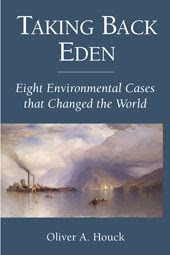A lot has happened since my last blog post more than seven months ago. In the fall I made several trips - in October to Wyoming for the annual meeting of the American College of Environmental Lawyers in Jackson Hole, in November to London for a terrific meeting at Kings College for authors of a new transnational environmental law book for which I am a contributor, in December to Australia to present at the annual meeting of the Asian Law & Society Association at Bond University on the Gold Coast. During spring break in March I traveled to Japan where I spent a day touring the Fukushima nuclear disaster area, 270 km north of Tokyo.
On the afternoon of March 10, 2011, a massive earthquake triggered a tsunami that devastated coastal communities in Fukushima prefecture, killing nearly 2,000 people. The tsunami flooded the the Fukushima Daiichi nuclear power complex, shutting off power to it, disabling its cooling systems and eventually causing hydrogen explosions the following day in the three of the four reactors that then were active. The explosions spread nuclear contaminants throughout the area. However, because there was substantial advance warning that the explosions would occur, the area’s population was evacuated in advance of the explosions, though some elderly and ill died during the sudden evacuation. The vast majority of deaths were caused by the tsunami and only a handful of people were believed to have experienced excessive radiation exposure.
As radioactivity in the area has declined, the exclusion zone has shrunk and some residents are being allowed to return to the region. I was fortunate to have arranged my tour with real-fukushima.com and guide Karin Taira, who operates The Latern guest house in Odaka. Because she is so respectful of the local communities she is one of the few who has permission to take her clients deep into the exclusion zone when the client’s credentials are approved in advance, as mine were. Our first stop was to visit with 93-year old Semei Sasaki in his home. Mr. Sasaki’s family has lived in the same house for centuries, dating back to the era of samurai warlords. He was allowed to move back to the area last year when the size of the exclusion zone was reduced, but he regrets that his extended family has decided not to return. While we were there he opened up mail from the government that included aerial photos of his lands with their latest readings for radioactivity. The Japanese government is conducting a massive soil decontamination effort, digging up radioactive top soil and moving it to local containment facilities. “Soil decontamination works!” Mr. Sasaki declared.
We then visited the port of Odaka where a massive new tsunami barrier is being constructed. The barrier will not be enough to prevent all future tsunami damage, but it is designed to diminish it. Prior to lunch we visited a shop where personal artifacts recovered in the tsunami debris are organized for survivors to reclaim. The wide range of material was stunning, ranging from laptops and cellphones to family photos. More than 50,000 items have been categorized and more than 7,000 have been reclaimed. After lunch we were allowed into the exclusion zone after our passports were checked as being on the list of permissible entrants. The destructive force of the tsunami was on full display in the twisted steel wreckage of a fish nursery just south of the reactor complex. From the abandoned Sunlight Okuma nursing home and Futuba Hospital we were able to get the best view of the damaged reactor complex.
We then visited the town of Okuma, which then was part of the exclusion zone, but subsequently has been reopened. After we left the exclusion zone we visited the Tokyo Electric Power Company’s Decommissioning Museum that previously had been used to educate the public about the wonders of nuclear power. Now it includes films and exhibits that include “profuse apologies” from the company for the accident and the confession that its prior confidence in the safety of nuclear power reflected “corporate arrogance.” It now is estimated that the cost of remediating the three disasters - earthquake, tsunami and nuclear accident - will be at least $202 billion, 4 percent of Japan’s GDP. Efforts to remove nuclear fuel from the damaged reactors, which have just begun, likely will take more than a quarter century.
I am pleased to report that twelve years after announcement of our project to publish the first casebook on global environmental law, the casebook manuscript is now finished and being copyedited. The key to completing the project was that Tseming Yang and I took on two other co-authors, Professor Anastasia Telesetsky from the University of Idaho College of Law and Lin Harmon-Walker who formerly was a professor of law at Pace University and Lewis and Clark Law School. Tseming did an amazing job of shepherding the four of us to complete the project. The book, Comparative and Global Environmental Law and Policy, will be published in fall 2019 by Wolters Kluwer. This website, which will be comprehensively redesigned this summer, may serve as the casebook website.
Maryland’s Transnational Environmental Accountability (TEA) Project has been selected as a finalist for the World Justice Challenge’s 2019 Access to Justice Award. Zhang Jingjing, Seema Kakade and I will be traveling to The Hague with three of our students to present the project at the World Justice Forum from April 29-May 2. We also will be co-chairing a session on access to justice with representatives from the UN Environment Programme and ABA’s Section on Environment, Energy and Resources. On March 29 Jingjing and I discussed the TEA Project at a symposium on regulation of extractive industries at William and Mary University Law School in Williamsburg, Virginia.
















